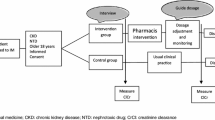Abstract
Objectives The primary goal of the present study was to implement and evaluate the impact of pharmaceutical care service for hospitalized chronic kidney disease (CKD) patients in Jordan. Setting Nephrology wards of one of the largest general hospitals in Jordan. Methods All patients who were previously diagnosed with CKD by their physician were eligible for inclusion in the study. Recruited patients were fully assessed for treatment related problems (TRPs) by a clinical pharmacist. Pharmaceutical care service was assessed through a systematic, prospective before–after design. Chi Square test was used to investigate association between categorical variables. P value <0.05 was considered to be statistically significant. Main outcome measures Study outcomes included: Process outcomes (prevalence and nature of identified TRPs, clinical significance of TRPs, associated diseases and drugs), General clinical outcomes (Therapeutic outcomes of TRPs) and CKD specific clinical outcomes (Change from baseline in the number of patients receiving appropriate progression modifying therapy and appropriate management of complications). Results 130 patients were included in the study. The average number of the identified TRPs was 5.31. Eighty-six percent of the recommendations were accepted by physicians. Efficacy related problems were the most common TRP category. Seventeen percent of all TRPs were resolved, 5.5 % were improved, and 37.4 % were prevented through the clinical pharmacist interventions. Conclusions The current study indicated that hospitalized patients with CKD suffer from multiple TRPs mostly related to efficacy of medications and patients monitoring. Clinical pharmacists substantially contributed towards the care of hospitalized CKD patients through optimizing progression modifying therapies, medications safety and management of CKD complications. Based on this study it is strongly recommended to implement pharmaceutical care services for hospitalized CKD patients.
Similar content being viewed by others
References
Canadian Institute for Health Information. Dialysis and Renal Transplantation. Canadian Replacement Register; 2001. http://www.cihi.ca/cihi-ext-portal/internet/en/document/types+of+care/specialized+services/organ+replacements/services_corr?
Chantrel F, Enache I, Bouiller M, Kolb I, Kunz K, Petitjean P, Moulin B, Hannedouche T. Abysmal prognosis of patients with type 2 diabetes entering dialysis. Nephrol Dial Transplant. 1999;14:129–36.
Valderrabano F, Golper T, Muirhead N, Ritz E, Levin A. Chronic kidney disease: why is current management uncoordinated and suboptimal? Nephrol Dial Transplant. 2001;16:61–4.
Kiberd BA, Clase CM. Cumulative risk for developing end-stage renal disease in the US population. J Am Soc Nephrol. 2002;13:1635–44.
Curtis BM, Ravani P, Malberti F, Kennett F, Taylor PA, Djurdjev O, Levin A. The short- and long-term impact of multi-disciplinary clinics in addition to standard nephrology care on patient outcomes. Nephrol Dial Transplant. 2005;20:147–54.
Chen RA, Scott S, Mattern WD, Mohini R, Nissenson AR. The case for disease management in chronic kidney disease. Dis Manag. 2006;9:86–92.
Nissenson AR, Collins AJ, Hurley J, Petersen H, Pereira BJ, Steinberg EP. Opportunities for improving the care of patients with chronic renal insufficiency: current practice patterns. J Am Soc Nephrol. 2001;12:1713–20.
Maiz HB, Abderrahim E, Zouaghi K. Anemia and end-stage renal disease in the developing world. Artif Organs. 2002;26:760–4.
Codreanu I, Perico N, Sharma SK, Schieppati A, Remuzzi G. Prevention programmes of progressive renal disease in developing nations. Nephrology. 2006;11:321–8.
Ayodele OE, Alebiosu CO. Burden of chronic kidney disease: an international perspective. Adv Chronic Kidney Dis. 2010;17:215–24.
Levin A, Stevens LA. Executing change in the management of chronic kidney disease: perspectives on guidelines and practice. Med Clin North Am. 2005;89:701–9.
St Peter WL, Schoolwerth AC, McGowan T, McClellan WM. Chronic kidney disease: issues and establishing programs and clinics for improved patient outcomes. Am J Kidney Dis. 2003;41:903–24.
Stemer G, Lemmens-Gruber R. Clinical pharmacy activities in chronic kidney disease and end-stage renal disease patients: a systematic literature review. BMC Nephrol. 2011;12:35.
Stemer G, Lemmens-Gruber R. The clinical pharmacist’s contributions within the multidisciplinary patient care team of an intern nephrology ward. Int J Clin Pharm. 2011;33:759–62.
Aburuz SM, Bulatova NR, Yousef AM, Al-Ghazawi MA, Alawwa IA, Al-Saleh A. Comprehensive assessment of treatment related problems in hospitalized medicine patients in Jordan. Int J Clin Pharm. 2011;33:501–11.
AbuRuz SM, Bulatova NR, Yousef AM. Validation of a comprehensive classification tool for treatment-related problems. Pharm World Sci. 2006;28:222–32.
Cipolle R, Strand L, Morley P. Pharmaceutical care practice: the clinician’s guide. 2nd ed. New York: McGraw-Hill; 2004. ISBN: 978-0071362597.
Aburuz S. The case for evidence based pharmaceutical care. Res Social Adm Pharm 2009: [Epub ahead of print].
Cockcroft DW, Gault MH. Prediction of creatinine clearance from serum creatinine. Nephron. 1976;16:31–41.
Spruill WJ, Wade WE, Cobb HH III. Estimating glomerular filtration rate with a modification of diet in renal disease equation: implications for pharmacy. Am J Health Syst Pharm. 2007;64:652–60.
Sarrafizadeh M, Waite NM, Hobson EH, Migden H. Pharmacist-facilitated enrollment in medication assistance programs in a private ambulatory care clinic. Am J Health Syst Pharm. 2004;61:1816–20.
Desrochers JF, Lemieux JP, Morin-Belanger C, Paradis FS, Lord A, Bell R, et al. Development and validation of the PAIR (Pharmacotherapy Assessment in Chronic Renal Disease) criteria to assess medication safety and use issues in patients with CKD. Am J Kidney Dis. 2011;58:527–35.
Patel HR, Pruchnicki MC, Hall LE. Assessment for chronic kidney disease service in high-risk patients at community health clinics. Ann Pharmacother. 2005;39:22–7.
Acknowledgments
The authors wish to thank all patients, pharmacists and physicians who contributed to the success of this work.
Funding
None.
Conflicts of interest
The Authors declare that they have no conflicts of interest to disclose.
Author information
Authors and Affiliations
Corresponding author
Rights and permissions
About this article
Cite this article
AbuRuz, S.M., Alrashdan, Y., Jarab, A. et al. Evaluation of the impact of pharmaceutical care service on hospitalized patients with chronic kidney disease in Jordan. Int J Clin Pharm 35, 780–789 (2013). https://doi.org/10.1007/s11096-013-9806-8
Received:
Accepted:
Published:
Issue Date:
DOI: https://doi.org/10.1007/s11096-013-9806-8




